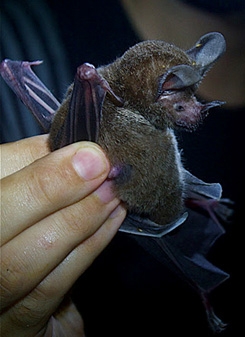
Wouter Halfwerk receives a Rubicon grant
Behavioural biologist Wouter Halfwerk has been awarded a 2-year outgoing Rubicon-grant from NWO. He will be working at the Smithsonian Tropical Research Institute with bats and frogs to understand the evolution of multimodal communication.

Signaling sex or snack in complex sensory environments
Elaborate animal courtship displays often involve complex signals that target different sensory systems, such as vision, hearing and smell. Such multimodal communication is in particular favoured in complex sensory environments as it can restore information sent between senders and receivers when one signal channel is temporarily blocked. Multimodal signals may therefore aid females in detecting potential mates, but may at the same time attract unwanted predators, leading to a potential trade-off between survival and reproduction.
Wouter Halfwerk will be studying the trade-off related to multimodal signals of Neotropical túngara frogs (Physalaemus pustulosus). Males of these frogs call and use inflation of the vocal sac as visual cue to attract females. Potentially the same cues may be used by frog-eating bats (Trachops cirrhosus) to find their prey. In his project, Wouter will test with the use of robotic male frogs to what extend acoustic and visual cue will aid bats and female frogs to detect a calling male frog.
Links
- Research institute: http://www.stri.si.edu/
- Bat research: http://www.noseleaf.com/
- Frog research: http://www.sbs.utexas.edu/ryan/index.html
